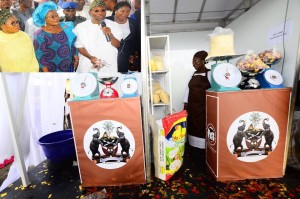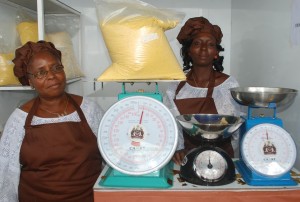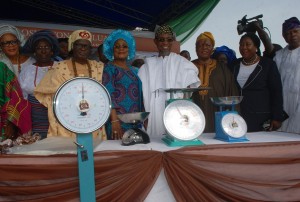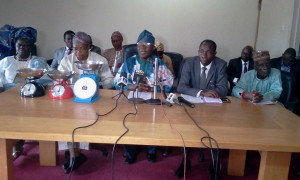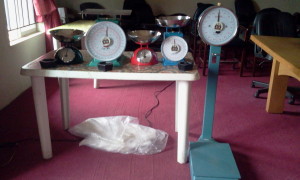Economy
Osunwon Omoluabi: An End to Cheating, Unprofitable Commercial Transaction in Osun
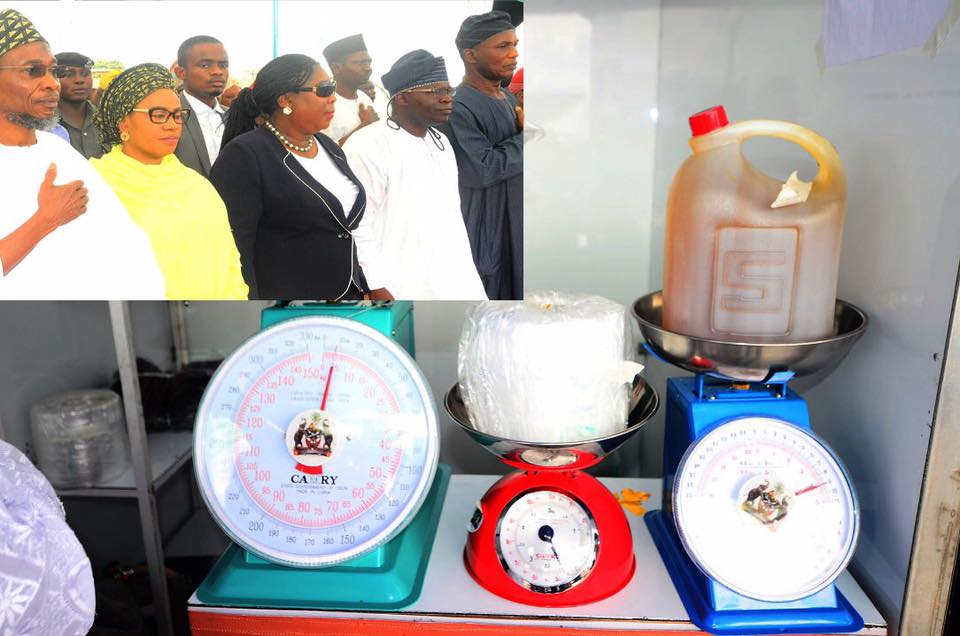
By Lukman Ayelabola
Monday, according to Yoruba believe, is a day of fortune (ojo Aje). The Yorubas believe that Monday, being the first working day of the week, bears fortunes for commercial activities and carries promising kismet for corporate workers. It is a common taboo in Yorubaland to ask for repayment of debt from debtor on Monday morning, because it is assumed that whatever you start Monday with would reflect on every day of that week. Also, Yoruba tradition forbids laziness, idleness and un-seriousness on Monday. Monday has become a significant day of attribution in government activities that relate to economic/commercial programmes under the administration of Governor Rauf Aregbesola of Osun State. On Monday, September 12, 2012, Aregbesola performed the turning of sod of Aje International Market at the Trade Fair Complex, Osogbo. Ayegbaju International Market was also commissioned on Monday July, 7, 2017 by the governor. Also, on Monday, April 25, 2016, Governor Aregbesola commissioned the first branch of Omoluabi Mortgage Bank Plc in Ejigbo, Osun state. These are few economic stamp executed by Aregbesola on Mondays.
Aregbesola has again launched a valuable commercial project on Monday, June 13, 2016. It was a day intimidating horde of government functionaries; technocrats, politicians, business gurus, traders, market men and women and enthusiast of Aregbesola and the AP gathered for an innovative project. The crowd could be best described as first mammoth throng to be witnessed at government event since the beginning of 2016. The crowd at the Nelson Mandela Freedom Park, Osogbo was agog for the launch of the much awaited device that would ensure cheating-free market across Osun State. The scheme was launched with market women and men to ensure that people get value for their money on whatever they buy from market, and also protect the traders from unprofitable commercial transaction. The device is simply called “Osunwon Omoluabi”, Standard Weighing Scale.
The basis of fair and honest trade has always rested on the use of accurate weights and measures. No business can be conducted satisfactorily unless each person is sure the other person is being fair and honest. Thus, throughout history, weights and measures have played an important, even if largely unseen, role. The need for measurements was one of those the primitive societies were confronted with; they needed rudimentary measures for many tasks, especially bartering food or raw materials. Thus, measurement was among one of the first intellectual achievements of early humans. People learned to measure centuries before they learned how to write and it was through measurement that people learned to count.
Weights and Measures constitute item 63 on the Exclusive Legislatives list of the 1999 Constitution of the Federal Republic of Nigeria. As far back as 1992 and 2004, Nigeria has enacted law for Standard weighing scale in the country. The various laws include; Weights and Measures Act CAP W3LFN, 2004, Pre-Shipment Inspection of Export Act CAP P25 LFN, 2004; Weights and Measures Standardization of Indigenous Measures Regulations, 1992 and the Weights and Measures Fees Regulations. These legislations are geared toward ensuring that products are not under-dispensed at markets, factories, oil and gas stations and crude oil depot in Nigeria. Although lofty and far reaching, the provisions of these Acts are simply not being enforced by the relevant authorities. These laws were made to protect the interest of both the buyers and the sellers, and to have reliable; balanced and fair markets where everybody gets value for what he/she buys or sells. Osun has begun to implement those laws, through the launching of the Osunwon Omoluabi for the use of market men and women.
The holy Bible says: “Unequal weights are an abomination to the Lord, and false scales are not good”. (Proverbs 20:23). “The LORD detests differing weights, and dishonest scales do not please him”. (Ezekiel 45:10). Also, Quran chapter 7:85 states: “use honest scales and to give just measure and weight; and do no mischief on earth” (Surah 7:85). “Establish weight with justice and fall not short in the balance”, Quran chapter 55:9. These biblical and quranic verses laid emphasis on the need to have and ensure a balanced and fair commercial transactions with honesty and fair trade.
Governor Aregbesola, while launching the standard weighing scale, stated the scheme would eliminates cheating and other underhand practices that have become the hallmark of trading in most markets. The governor averred that the use of standardized scales in markets across the state will give rise to a chain of economic benefits, adding that market expansion for dealers in weighing scales is assured as the programme will increase the demand for the product. Aregbesola said the move was to make the state the preferred destination for commercial activities in the sub-region, reiterating that his administration would not relent in its goal of developing economic activities in the state.
He said: “In the quest to be competitive and make more profit, which is greed, traders now devise varying means of short-changing buyers. Measures are deliberately reduced through cutting, filling with candles and wax, and sleight of hand. Scales are tilted fraudulently while husks, chaffs, barks and other rubbish are included in goods sold, with the intention of reducing the actual values of what the buyers take home. One of the tragedies of this immoral practice is that foreigners began to distrust our export because, for instance, cocoa graders put top grades at the top of the sack, leaving poor quality at the bottom, and in the process, collect money for the top grade. Those who are in the business can tell you what loss they suffered because the foreigners distrusted their products and classified all cocoa coming from our land as inferior, irrespective of the grade.”
The coordinator of the scheme, Mr. Ismaila Adekunle Jayeoba-Alagbada, who is the former Commissioner for Industries, Commerce, Cooperatives and Empowerment, the standardized maintained that the standardised weighing scale across markets in the state became necessary to mitigate challenges noticeable in commercial transactions. Jayeoba-Alagbada said in order to erase cheating in the process of exchange of commercial goods and checkmate other market forces challenges, government decided to formally introduce the standardised weighing scales.
The former commissioner stated that training workshops had already been conducted in the markets all over the state on the effective use of the scales.He stated that the Ministry of Industries, Commerce, Cooperatives and Empowerment is saddled with the responsibility of monitoring the day-to-day administration of the programme. He said: “I need to emphasise that market women and men had been fully mobilised to key into this emerging commercial revolution. Both the leadership and the followership of the associations of market women and men had agreed, not only to comply with the right use of the scales and measures but to continuously carry out peer reviews with a view to ensuring flawless implementation of the standardised weighing scales and measures programme. I want to place it on record that, but for the grace of God and the dogged determination of Mr. Governor, this launch and indeed the entire standardised scales and measures programme would have been a mirage.”
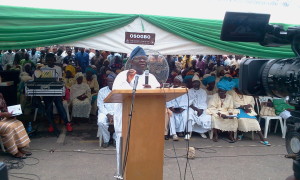
the former Commissioner for Industries, Commerce, Cooperatives and Empowerment, Mr. Ismaila Adekunle Jayeoba-Alagbada addressing people at the event.
The President General of Osun State Market Women Association, Alhaja Awawu Asindemade, said the standardised scale became necessary owing to imbalance in measurement and fraud in commercial activities. Asindemade said the Kongo measurement introduced to the market in the old Oyo State became the standard measurement in Osun when it was created. According to Market leader, the old measurement was gradually subjected to abuse and fraud to the extent that individual seller used his or her yardstick for measurement, thus the need to re-standardise and unify it. She however warned that the introduction of the standard scale should not translate to increase in commodity price system in the market.
Asindemade: “It is in a bid to correct the anomaly in measurement and scale that the Government of Osun introduced the standardised weighing scales in markets in the state so as to forestall fraud and cheating in measurement. As we welcome this innovation, I call on my constituency – market men and women – to cooperate with government to make this a success. Besides, introduction of this weight and measurement does is not and should not lead to increase in price of commodities in our market.”
The Osunwon Omoluabi has been subsidized by the state government for the traders. For example, from the supplier in Lagos, a 150kg platform is sold for N38, 500, but the state government is selling it N28, 500. The prices of the scales are: 150kg (table) N8500, 20kg N2500, 10kg 2500, while 5kg is N2000. One hundred and seventy-eight (178) OYES cadets have been trained under the train the trainer programme on the use, maintenance and repairs of the Osunwon Omoluabi. The OYES cadet would also man some control posts in all the market to serve both as repair and challenge-mitigating centres.
The Osun Ministry of Industries, Commerce, Cooperatives and Empowerment has created Scale Unit in the ministry for proper coordination of the project. The unit, according to the Information Officer of the Ministry, Miss Ademiotan Adegbulugbe, has embarked on sensitization tour to market and public places to educate the market men and women on the usage and importance of the scale. The sensitization team has so far visited the popular Sekona market, Sekona, Obada market in Ede and Owode market, Owode. Adegbulugbe disclosed that the traders were responding positively to the scale as sizeable number of market men and women have bought the scale.
Trade and Commercial activities have always been at the foundation of every civilization. No society can develop and prosper without its citizens being involved in business transactions. And, there is no transaction that can be conducted to the mutual satisfaction of the parties involved unless each is assured the other is fair and honest. Thus, the introduction of Osunwon Omoluabi is a right step in the right direction.
-

 News5 days ago
News5 days agoInsecurity: Kogi Schools Resume On Monday
-

 Opinion4 days ago
Opinion4 days agoDon’t Pull the Plug: Why Nigerians Are Pleading for the U.S. to Extend Its Police Training Program — and Why It Must Synergize With New Military Arrivals
-

 Crime4 days ago
Crime4 days agoVigilante Reportedly Shoots Colleague Dead In Plateau
-

 Crime4 days ago
Crime4 days agoMan Shot Dead In Ambush Along Jol-Sho Road In Plateau

